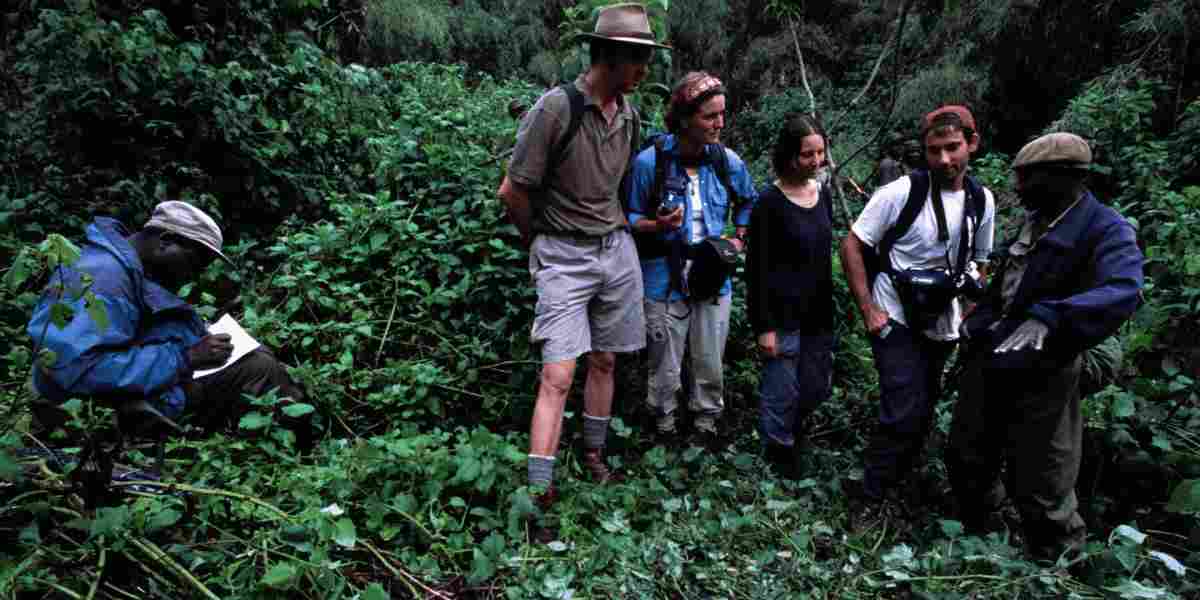 Ecotourism is a captivating journey that combines the exploration of diverse natural landscapes, the encounter with abundant wildlife, and the immersion into vibrant local cultures. As a country renowned for its breathtaking beauty and rich biodiversity, Homejoy Safari Adventures makes it possible for tourists to have a remarkable experience especially if they seek an eco-friendly and sustainable approach to tourism. With its thriving ecosystems, including national parks, reserves, and coastal areas, Kenya provides the perfect backdrop for ecotourism adventures. Visitors can witness the iconic African Big Five in their natural habitats, marvel at the wildebeest migration in the Maasai Mara, trek through the picturesque landscapes of Mount Kenya, or indulge in the pristine beaches of the Kenyan coast. To ensure a truly immersive and responsible ecotourism experience, Kenya Safaris tour consultation services in Kenya play a vital role. These services provide expert guidance and personalized itineraries that cater to the specific interests and conservation values of travelers. Whether it's wildlife safaris, birdwatching, cultural visits, or hiking expeditions, tour consultants work closely with visitors to create unforgettable experiences that align with sustainable tourism practices. Beyond the stunning landscapes and diverse wildlife, Kenyan tours also offer opportunities to engage with local communities and contribute to their economic empowerment. Tourists can interact with indigenous tribes, participate in cultural ceremonies, and support community-based tourism initiatives that preserve traditional practices and craftsmanship. Let us dive into the potential of ecotourism, explore the benefits it brings to conservation and local communities, and highlight the role of tour consultation services in creating unforgettable and sustainable experiences. Reach out to us for help to embark on a Kenya Safari to discover the wonders of sustainable tourism in Kenya and unlock the secrets of this captivating destination.
Ecotourism is a captivating journey that combines the exploration of diverse natural landscapes, the encounter with abundant wildlife, and the immersion into vibrant local cultures. As a country renowned for its breathtaking beauty and rich biodiversity, Homejoy Safari Adventures makes it possible for tourists to have a remarkable experience especially if they seek an eco-friendly and sustainable approach to tourism. With its thriving ecosystems, including national parks, reserves, and coastal areas, Kenya provides the perfect backdrop for ecotourism adventures. Visitors can witness the iconic African Big Five in their natural habitats, marvel at the wildebeest migration in the Maasai Mara, trek through the picturesque landscapes of Mount Kenya, or indulge in the pristine beaches of the Kenyan coast. To ensure a truly immersive and responsible ecotourism experience, Kenya Safaris tour consultation services in Kenya play a vital role. These services provide expert guidance and personalized itineraries that cater to the specific interests and conservation values of travelers. Whether it's wildlife safaris, birdwatching, cultural visits, or hiking expeditions, tour consultants work closely with visitors to create unforgettable experiences that align with sustainable tourism practices. Beyond the stunning landscapes and diverse wildlife, Kenyan tours also offer opportunities to engage with local communities and contribute to their economic empowerment. Tourists can interact with indigenous tribes, participate in cultural ceremonies, and support community-based tourism initiatives that preserve traditional practices and craftsmanship. Let us dive into the potential of ecotourism, explore the benefits it brings to conservation and local communities, and highlight the role of tour consultation services in creating unforgettable and sustainable experiences. Reach out to us for help to embark on a Kenya Safari to discover the wonders of sustainable tourism in Kenya and unlock the secrets of this captivating destination.
Overview of Kenya's Ecotourism Potential, a Summary
Kenya, located in East Africa, is renowned for its breathtaking landscapes, abundant wildlife, and vibrant culture. It is a country with immense potential for ecotourism, a form of tourism that focuses on experiencing and conserving the natural environment while supporting local communities. Going on adventurous Kenya Safaris can help you understand its ecotourism potential and discover why Kenya is a top destination for nature lovers and adventure seekers.
- Rich biodiversity and natural resources: From vast savannahs to dense forests, and towering mountains to stunning coastlines, the country offers a diverse range of ecosystems. Within these ecosystems, visitors can encounter a remarkable array of plant and animal species, including the iconic African Big Five (lion, leopard, elephant, buffalo, and rhinoceros), giraffes, zebras, wildebeests, and numerous bird species. The Great Rift Valley, a geological marvel, runs through Kenya, presenting breathtaking landscapes and the opportunity for unforgettable experiences.
- Unique wildlife and landscapes: This country is home to world-renowned national parks and reserves, such as the Maasai Mara National Reserve, Amboseli National Park, Mount Kenya National Park, and Tsavo National Park. These protected areas offer visitors the chance to observe wildlife in their natural habitats and partake in thrilling safari experiences. The annual wildebeest migration, where millions of wildebeests and other herbivores traverse the Mara-Serengeti ecosystem, is a spectacle that draws nature enthusiasts from around the globe.
- Cultural heritage and local communities: Kenya's ecotourism goes beyond its natural attractions; it also encompasses its rich cultural heritage and the involvement of local communities. The country harbors various ethnic groups, each with its distinct traditions, music, dance, and craftsmanship. Engaging with local communities allows visitors to gain a deeper understanding of Kenya's diverse cultures and foster cultural preservation.
Benefits of Ecotourism in Kenya - Outdoor Recreation
Ecotourism brings about numerous benefits, both for the environment and for local communities.
- Conservation of natural resources and wildlife: National parks and reserves play a crucial role in preserving biodiversity and providing a safe haven for endangered species. Income generated from ecotourism activities directly contributes to conservation efforts, including anti-poaching initiatives and habitat restoration programs. Furthermore, ecotourism raises awareness among visitors about the importance of environmental conservation, fostering a sense of responsibility and support for these initiatives.
- Economic opportunities for local communities: Ecotourism provides significant economic prospects for native people residing near tourist destinations as it promotes the development of community-based tourism initiatives, where local people actively participate in offering unique cultural experiences and providing accommodation, food, and other services to visitors. This empowers local communities economically, reduces poverty, and creates employment opportunities by ensuring that the economic benefits are shared equitably, contributing to a more inclusive and sustainable tourism industry.
- Cultural preservation and awareness: It encourages the revitalization of traditional practices, craftsmanship, and local arts. Tourists can engage in cultural exchanges, participate in traditional ceremonies, and support local artisans by purchasing their crafts. This not only helps preserve cultural traditions but also creates a sense of pride and identity among local communities. Ecotourism fosters cultural awareness and understanding among visitors providing opportunities for cultural immersion, allowing tourists to interact with local communities, learn about their traditions and way of life, and gain a deeper appreciation for the cultural diversity of Kenya as these interactions promote cross-cultural understanding, tolerance, and respect.
- Sustainable development and environmental protection: The exercise promotes responsible tourism practices that minimize negative impacts on the environment and local communities. Kenyan Safaris & tour operators and accommodation providers are increasingly adopting eco-friendly measures, such as energy conservation, waste management, and water conservation, to minimize their ecological footprint. Sustainable tourism practices encourage the involvement of local communities in decision-making processes. This ensures that their voices are heard, their needs are considered, and the benefits of tourism are distributed equitably. By integrating environmental and social considerations into tourism planning and development, ecotourism contributes to the long-term preservation of Kenya's natural and cultural heritage. The mentioned above are majorly the benefits of ecotourism in Kenya
Challenges and Solutions in Ecotourism; Ask a Trained Tour Guide
While ecotourism brings significant benefits, it also faces challenges that need to be addressed to ensure its long-term sustainability.
- Environmental impact and conservation challenges: The increasing number of tourists can put pressure on fragile ecosystems and wildlife habitats. It is essential to implement strict regulations and sustainable tourism practices to minimize ecological impacts, such as controlled visitor numbers, responsible waste management, and habitat restoration programs.
- Socio-cultural impacts and community involvement: Ecotourism should prioritize the involvement and empowerment of local communities to avoid negative socio-cultural impacts. It is crucial to respect local customs, traditions, and ways of life while ensuring that tourism activities provide equitable economic opportunities and support community development initiatives.
- Education and awareness: Promoting education and awareness among tourists, local communities, and tour operators who help with Kenya Safaris is crucial for fostering a culture of responsible and sustainable tourism. This includes educating visitors about the importance of conservation, sustainable practices, and cultural sensitivity, as well as providing training and capacity-building opportunities for local communities to actively participate in the tourism industry.
E-tourism in Kenya offers a unique and sustainable way to explore the rich natural beauty and diverse wildlife of this enchanting country. By choosing to participate in ecotourism, travelers not only enjoy the wonders of Kenya's landscapes, but also contribute to the conservation of its ecosystems and the well-being of local communities. Planning your Kenyan safari with a focus on ecotourism principles ensures a more meaningful and impactful experience, allowing you to immerse yourself in the local culture while minimizing your environmental footprint. Consulting with experts in Kenya safaris planning can help tailor your adventure to match your interests while adhering to ecotourism guidelines. Embracing sustainable tourism in Kenya not only promises an unforgettable journey but also supports the preservation of this magnificent country for future generations to enjoy.
Popular Ecotourism Destinations in Kenya; Top Places & Activities
 Kenya, a country renowned for its breathtaking landscapes, diverse wildlife, and rich cultural heritage, stands as a beacon for ecotourism enthusiasts from across the globe. Nestled in the heart of East Africa, this vibrant nation offers an array of experiences that cater to the adventurous spirit while promoting sustainability and conservation. The concept of ecotourism, which emphasizes responsible travel to natural areas that conserves the environment and improves the well-being of local people, is deeply ingrained in Kenya's approach to tourism. Below is a journey through Kenya's most popular ecotourism destinations, highlighting the top places to visit and the activities that make each of them unique. From the majestic peaks of Mount Kenya to the sprawling savannahs of the Maasai Mara, Kenya's natural beauty is unmatched. The country's commitment to conservation is evident in its numerous national parks and reserves, which are home to some of the world's most endangered species. As travelers seek more sustainable and meaningful experiences, Kenya's ecotourism destinations offer the perfect blend of adventure and environmental stewardship. One cannot talk about Kenya's ecotourism without mentioning the Maasai Mara National Reserve, known for its exceptional population of lions, leopards, cheetahs, and the annual migration of zebra, Thomson's gazelle, and wildebeest to and from the Serengeti every year from July to October, known as the Great Migration. Similarly, the Amboseli National Park, with its stunning views of Mount Kilimanjaro and large herds of African elephants, provides a spectacular backdrop for wildlife viewing and photography, making it a must-visit destination for nature lovers. For those interested in marine life, the Watamu Marine National Park offers a unique underwater experience with its coral gardens, over 600 species of fish, and an array of sea turtles. On the coast, the historical Gedi Ruins near Malindi, enveloped by lush forest, offer a glimpse into Kenya's rich cultural past and biodiversity. Kenya's commitment to ecotourism extends beyond wildlife conservation. Community-based initiatives across the country allow visitors to engage with local communities, learn about traditional practices, and contribute to sustainable development. Whether it's participating in a Maasai village visit, bird watching in the serene Lake Nakuru, or trekking through the cloud forests of the Aberdare Ranges, Kenya offers an ecotourism experience that is both enriching and exhilarating. Therefore, these popular ecotourism destinations in Kenya provide travelers with an unforgettable journey into the heart of Africa's natural beauty and cultural richness. By choosing to explore these top places and engage in responsible activities, visitors not only witness the wonders of nature but also play a role in preserving them for future generations.
Kenya, a country renowned for its breathtaking landscapes, diverse wildlife, and rich cultural heritage, stands as a beacon for ecotourism enthusiasts from across the globe. Nestled in the heart of East Africa, this vibrant nation offers an array of experiences that cater to the adventurous spirit while promoting sustainability and conservation. The concept of ecotourism, which emphasizes responsible travel to natural areas that conserves the environment and improves the well-being of local people, is deeply ingrained in Kenya's approach to tourism. Below is a journey through Kenya's most popular ecotourism destinations, highlighting the top places to visit and the activities that make each of them unique. From the majestic peaks of Mount Kenya to the sprawling savannahs of the Maasai Mara, Kenya's natural beauty is unmatched. The country's commitment to conservation is evident in its numerous national parks and reserves, which are home to some of the world's most endangered species. As travelers seek more sustainable and meaningful experiences, Kenya's ecotourism destinations offer the perfect blend of adventure and environmental stewardship. One cannot talk about Kenya's ecotourism without mentioning the Maasai Mara National Reserve, known for its exceptional population of lions, leopards, cheetahs, and the annual migration of zebra, Thomson's gazelle, and wildebeest to and from the Serengeti every year from July to October, known as the Great Migration. Similarly, the Amboseli National Park, with its stunning views of Mount Kilimanjaro and large herds of African elephants, provides a spectacular backdrop for wildlife viewing and photography, making it a must-visit destination for nature lovers. For those interested in marine life, the Watamu Marine National Park offers a unique underwater experience with its coral gardens, over 600 species of fish, and an array of sea turtles. On the coast, the historical Gedi Ruins near Malindi, enveloped by lush forest, offer a glimpse into Kenya's rich cultural past and biodiversity. Kenya's commitment to ecotourism extends beyond wildlife conservation. Community-based initiatives across the country allow visitors to engage with local communities, learn about traditional practices, and contribute to sustainable development. Whether it's participating in a Maasai village visit, bird watching in the serene Lake Nakuru, or trekking through the cloud forests of the Aberdare Ranges, Kenya offers an ecotourism experience that is both enriching and exhilarating. Therefore, these popular ecotourism destinations in Kenya provide travelers with an unforgettable journey into the heart of Africa's natural beauty and cultural richness. By choosing to explore these top places and engage in responsible activities, visitors not only witness the wonders of nature but also play a role in preserving them for future generations.
Here are Some of the Most-Visited Kenyan Ecotourism Destinations
Kenya offers a plethora of breathtaking ecotourism destinations that cater to diverse interests. Some of the popular destinations include:
- Maasai Mara National Reserve: Known for its spectacular wildebeest migration, the Maasai Mara National Reserve offers thrilling game drives, hot air balloon safaris, and the chance to witness the Big Five in their natural habitat.
- Amboseli National Park: This is famous for its large elephant herds and stunning views of Africa's highest peak. Visitors can enjoy game drives, birdwatching, and cultural encounters with the Maasai community.
- Mount Kenya National Park: It is a UNESCO World Heritage Site and home to the second-highest peak in Africa which offers opportunities for trekking, mountain climbing, and exploring unique montane ecosystems with diverse flora and fauna.
- Tsavo National Park: One of the largest wildlife sanctuaries in the world, divided into Tsavo East and Tsavo West, which is known for its vast landscapes, rich wildlife, and iconic landmarks like the Mudanda Rock and the Yatta Plateau.
- Lamu Island: Located on the Kenyan coast, Lamu Island is a UNESCO World Heritage Site renowned for its Swahili architecture, pristine beaches, and vibrant cultural festivals where tourists can explore the narrow streets of Lamu Town, enjoy water sports, and experience the traditional way of life.
Examples of Ecotourism Activities in Kenya – Tour Adventures
In Kenya, a wide range of ecotourism opportunities and experiences await travelers seeking adventure and connection with nature and culture. Some popular activities include:
- Wildlife safaris and game drives: Going on wildlife Kenya Safaris or game drives is a quintessential experience in Kenya. Guided by knowledgeable Homejoy Safari Adventures experts, visitors can witness the majestic Big Five, observe rare bird species, and admire the natural beauty of Kenya's national parks and reserves.
- Birdwatching and nature walk: Kenya is a paradise for birdwatching enthusiasts, with over 1,000 bird species recorded. Guided birdwatching tours take visitors to diverse habitats, such as wetlands, forests, and savannahs, where they can spot vibrant and rare bird species. Nature walks allow for a closer exploration of Kenya's flora, fauna, and ecosystems, providing a more intimate connection with nature.
- Cultural visits and community-based tourism: Immersing oneself in Kenya's rich cultural heritage is a rewarding experience. Tourists can visit local communities, interact with indigenous tribes like the Maasai and Samburu, learn about their traditions, participate in cultural ceremonies, and support community-led initiatives, such as handicraft workshops and traditional music and dance performances.
- Hiking, trekking, and mountaineering: Kenya's diverse landscapes offer excellent opportunities for outdoor enthusiasts. Hiking and trekking expeditions take adventurers through lush forests, rolling hills, and rugged terrains, including the ascent of Mount Kenya or the lesser-known Aberdare Range. Mountaineering enthusiasts can challenge themselves by climbing Mount Kenya, a thrilling experience that rewards climbers with stunning panoramic views.
- Water-based activities such as snorkeling and diving: Kenya's coastal region, particularly the Marine National Parks and Reserves, provides an enchanting underwater world for snorkeling and diving enthusiasts. Vibrant coral reefs, tropical fish, and other marine species create a unique and mesmerizing experience.
Kenya, a country renowned for its majestic wildlife and breathtaking landscapes, offers a plethora of ecotourism activities that cater to nature enthusiasts and adventure seekers alike. From witnessing the Great Migration in the Maasai Mara to exploring the pristine beaches of the Indian Ocean coast, visitors can immerse themselves in conservation efforts and sustainable travel experiences. Ecotourism Activities in Kenya include bird watching in the Rift Valley lakes, trekking Mount Kenya, or participating in community-based tourism initiatives, showcasing Kenya's commitment to preserving its natural heritage while providing unforgettable experiences.
 In Kenya, ecotourism supported by tour consultation services, offers a gateway to extraordinary experiences that blend nature, culture, and sustainability. With its rich biodiversity, unique wildlife, and diverse landscapes, Kenya presents an ideal destination for those seeking responsible and immersive travel. By collaborating with expert local tour guides like Homejoy Safari Adventures, visitors can explore iconic national parks, engage with local communities, and contribute to conservation efforts. Customized itineraries ensure that each traveler's interests and values are met, while sustainable practices promote the long-term preservation of Kenya's natural and cultural heritage. Through ecotourism, visitors not only create unforgettable memories but also become advocates for environmental protection and socio-economic empowerment. By embracing ecotourism and tour consultation services, Kenya invites travelers to experience its wonders while making a positive impact on the environment and local communities. Kenya stands as a beacon of ecotourism, inviting travelers to experience its unique blend of breathtaking landscapes, rich biodiversity, and vibrant cultures, all while promoting environmental sustainability and community well-being. From the iconic Maasai Mara, with its spectacular wildebeest migration, to the serene beauty of the Amboseli National Park, shadowed by the majestic Mount Kilimanjaro, Kenya offers unparalleled wildlife encounters and natural wonders. The coastal gem of Watamu provides an idyllic retreat for marine conservation enthusiasts, while the sacred forests of the Kakamega and the rugged terrains of the Tsavo offer deep dives into the heart of Africa’s untouched wilderness. Engaging in these ecotourism destinations in Kenya not only supports the country's conservation efforts but also contributes to local communities, ensuring the preservation of these natural treasures for future generations. As we explore these magnificent places and partake in activities like wildlife safaris, cultural tours, and conservation projects, we are reminded of the importance of traveling responsibly, leaving a positive impact on both the environment and the local communities.
In Kenya, ecotourism supported by tour consultation services, offers a gateway to extraordinary experiences that blend nature, culture, and sustainability. With its rich biodiversity, unique wildlife, and diverse landscapes, Kenya presents an ideal destination for those seeking responsible and immersive travel. By collaborating with expert local tour guides like Homejoy Safari Adventures, visitors can explore iconic national parks, engage with local communities, and contribute to conservation efforts. Customized itineraries ensure that each traveler's interests and values are met, while sustainable practices promote the long-term preservation of Kenya's natural and cultural heritage. Through ecotourism, visitors not only create unforgettable memories but also become advocates for environmental protection and socio-economic empowerment. By embracing ecotourism and tour consultation services, Kenya invites travelers to experience its wonders while making a positive impact on the environment and local communities. Kenya stands as a beacon of ecotourism, inviting travelers to experience its unique blend of breathtaking landscapes, rich biodiversity, and vibrant cultures, all while promoting environmental sustainability and community well-being. From the iconic Maasai Mara, with its spectacular wildebeest migration, to the serene beauty of the Amboseli National Park, shadowed by the majestic Mount Kilimanjaro, Kenya offers unparalleled wildlife encounters and natural wonders. The coastal gem of Watamu provides an idyllic retreat for marine conservation enthusiasts, while the sacred forests of the Kakamega and the rugged terrains of the Tsavo offer deep dives into the heart of Africa’s untouched wilderness. Engaging in these ecotourism destinations in Kenya not only supports the country's conservation efforts but also contributes to local communities, ensuring the preservation of these natural treasures for future generations. As we explore these magnificent places and partake in activities like wildlife safaris, cultural tours, and conservation projects, we are reminded of the importance of traveling responsibly, leaving a positive impact on both the environment and the local communities.
Eco Friendly Accommodations in Kenya - Family-Friendly Options
Eco-friendly accommodations in Kenya offer a unique and sustainable way to experience the country's stunning landscapes, diverse cultures, and abundant wildlife while minimizing environmental impact. These accommodations range from luxury eco-lodges nestled in the heart of wildlife reserves to simple, yet charming, eco-camps that provide a closer connection to nature. For families looking to explore Kenya in an environmentally responsible manner, there are several family-friendly options that not only ensure comfort and safety but also engage young travelers in conservation and cultural education. Here's an in-depth look at eco-friendly accommodations in Kenya that cater to families.
1. Educational Experience and Wildlife Conservation
Many eco-friendly accommodations in Kenya are not just places to stay; they're gateways to understanding and participating in wildlife conservation. For example, the Elewana Collection’s Loisaba Tented Camp offers families the unique opportunity to learn about and engage in the conservation efforts for elephants and other local wildlife. The camp operates in partnership with the Loisaba Conservancy, a vital corridor for elephant migration. Families can participate in guided nature walks, conservation talks, and even visit the anti-poaching sniffer dog unit, making it a fascinating educational experience for both adults and children.
2. Cultural Immersion
Eco-friendly lodges often emphasize cultural experiences, allowing families to learn about local communities and traditions. Sarara Camp, located in the Mathews Range, works closely with the local Samburu tribes, offering guests a chance to immerse themselves in Samburu culture through village visits, traditional dance performances, and interactive cultural talks. This not only provides a unique cultural experience but also supports the local community directly.
3. Sustainable Practices
Eco-friendly accommodations in Kenya are pioneers in implementing sustainable practices, from solar energy and water recycling systems to organic gardens and farm-to-table dining. Basecamp Explorer Kenya, for example, offers an exemplary model of sustainability with its eco-camps in the Masai Mara. The camps are powered entirely by solar energy, and water usage is carefully managed to ensure minimal environmental impact. Additionally, they run a tree planting initiative, allowing families to contribute directly to reforestation efforts.
4. Adventure and Outdoor Activities
For families seeking adventure, Kenya's eco-friendly accommodations offer a plethora of outdoor activities tailored to all ages. The Emakoko, a luxury lodge in Nairobi National Park, provides families with the thrill of game drives, guided nature walks, and even horseback riding safaris. Its unique location allows for wildlife viewing right from the comfort of your lodge, making it an exciting option for families with younger children who might not be ready for full-day safaris.
5. Comfort and Luxury in Harmony with Nature
Choosing eco friendly accommodations in kenya doesn't mean sacrificing comfort. Many lodges and camps offer luxurious amenities such as private plunge pools, gourmet dining, and spa services, all designed with sustainability in mind. Giraffe Manor, famous for its resident herd of Rothschild's giraffes, combines luxury with conservation. Families can enjoy breakfast with giraffes, an unforgettable experience, while learning about giraffe conservation efforts.
What are the Benefits of Staying at Eco Lodges in Kenya?
Kenya, a country known for its breathtaking landscapes, diverse wildlife, and rich cultural heritage, has increasingly become a hub for eco-tourism. One of the key components of this green movement is the rise of eco lodges. These establishments are not just accommodations; they are part of a broader commitment to preserving the environment and supporting local communities. Here are six benefits of staying at eco lodges and camps in Kenya:
Environmental Preservation: Eco-lodges in Kenya are designed to minimize their impact on the environment. They use sustainable materials in construction, rely on renewable energy sources such as solar power, and implement water-saving measures. By staying at these lodges, travelers directly contribute to the conservation of Kenya's natural resources and habitats, ensuring that its beauty can be enjoyed by future generations.
Authentic Experiences: Unlike conventional hotels, eco lodges offer a more immersive experience. They are often located in remote, pristine areas, offering guests unique opportunities to explore the untouched beauty of Kenya. From guided nature walks to wildlife safaris, the activities are designed to respect the natural environment and provide an authentic insight into the local ecosystem.
Support for Local Communities: Eco lodges often work closely with nearby communities, providing employment opportunities and supporting local economies. Many also invest in community projects such as schools and healthcare facilities. Guests can feel good knowing that their stay helps improve the livelihoods of local people.
Cultural Exchange: Staying at an eco lodge often allows for meaningful cultural exchanges. Many lodges offer cultural tours or community visits, giving guests the chance to learn about local traditions, crafts, and ways of life. This not only enriches the travel experience but also fosters respect and appreciation for different cultures.
Health and Wellbeing: The serene and natural settings of eco lodges offer a perfect escape from the hustle and bustle of daily life. The clean air, quiet surroundings, and beautiful landscapes contribute to a sense of wellbeing and relaxation that can be hard to find in more urban environments.
Unique Accommodations: Eco lodges provide a unique lodging experience. From treehouses nestled in the canopy to tented camps overlooking wildlife reserves, these accommodations are designed to blend in with the environment. This unique approach to hospitality allows guests to connect with nature in a comfortable and sustainable manner.
Staying at eco lodges in Kenya offers more than just a place to sleep. It's an opportunity to engage with the environment, support local communities, enjoy authentic experiences, and contribute to the sustainability of one of the world's most beautiful destinations. Eco-friendly accommodations in Kenya provide families with an extraordinary opportunity to explore one of the world's most diverse ecosystems in a sustainable and responsible manner. These eco friendly accommodations in Kenya not only offer comfort and luxury but also ensure that guests leave with a deeper understanding and appreciation for wildlife conservation, cultural heritage, and environmental sustainability. By choosing eco-friendly accommodations, families can enjoy a memorable Kenyan adventure that aligns with the values of conservation and community support, making their trip not just a vacation, but a contribution to a better world.


